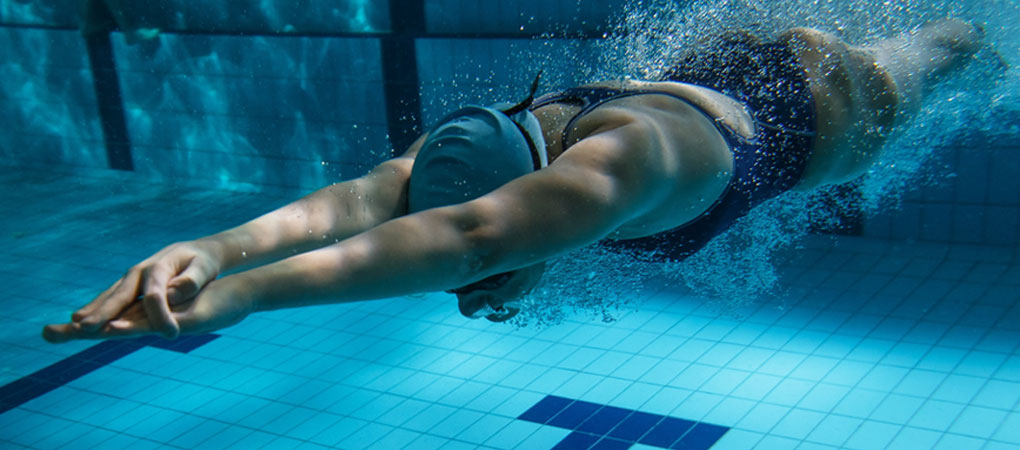SELF CONFIDENCE- It’s Your Choice
By Rick Paine, Director of Swimming
Definition- assurance: freedom from doubt; belief in yourself and your abilities
Objectives of this article are to:
- develop an in-depth understanding of what confidence actually is;
- examine the relationship between confidence and sport performance;
- determine ways confidence can be assessed;
- consider strategies for helping you develop and maintain confidence; and
- discuss optimism versus pessimism in building confidence.
|
Q: What separates successful from
unsuccessful athletes?
Ans.: It is typically not their physical or
technical capabilities but rather their
belief in their ability to use those
capabilities at critical times in the most
important competitions.
self-efficacy – an athletes’ belief that they have the necessary skills to produce a desired outcome.
self-confidence – an athletes’ certainty that they have the ability to be successful in their sport; belief in one’s ability to achieve one’s goals and fully realize their ability. So, how do you define success?
|
Does confidence encourage athletes to
seek out pressure situations and to view
difficult conditions and tough opponents
as challenges to pursue?
Sources of sport confidence:
- mastery (includes recognizing strengths) of swimming techniques.
- demonstration of ability (past positive experiences—maintain a “Success Log”)
- *mental and physical preparation (including positive imagery)
- ideal intensity level- understanding how to swim races.
- physical self-presentation- how do you carry yourself?
- *social support- peer group and family.
- vicarious experience (watching others succeed who are similar to you)
- coach’s leadership
- feeling comfortable in competitive situations
*social support – tends NOT to instill a lasting and resilient belief. It can be easily invalidated by failure. Friends and family tend to tell you want you want to hear. Athletes need to rely on more influential and enduring strategies as they approach competition.
*Mental preparation.
Research tells us the self-talk is not affective and could actually take you out of the “Zone.” Visualizing past and future success is infinitely more effective than any form of self-talk. Most self-talk borders on self-flattery, has little value, and is easily invalidated by the athlete.
In place of positive words and phrases, develop positive forms of imagery, including ones that involve all of the senses.
Choosing Confidence!
|
Step 1. Self-analysis. Am I confident in
key situations?
Step 2. Knowledge. If no, what activities
will help me gain confidence in key
situations?
Step 3. Self-development. What activities do I perform on a daily basis to
improve my confidence?
“I have prepared as well as I can physically, technically, tactically, and mentally.”
|
Gaining Confidence from Adversity
…expose yourself to many forms of adversity and
learn to respond positively. This can involve any
activity in life and athletics that takes you our of
your comfort zone.
Learning from adversity begins with experiencing adversity, or more adversity, in training that you are likely to face in competition. Are you certain that you are training at a high enough level?
Don’t be afraid to race someone you have never beaten before or to swim an event you have never swum before.
|
Enjoying Success
How do you define success?
When pessimistic athletes are successful they will usually attribute their success to factors that are beyond their control.
Attributions – perceived causes or reasons athletes give for an event related either to themselves or others.
Confidence influences the types of attributions athletes make.
Optimism
- personalization
- pervasiveness
- permanence
Personalization
Optimistic athletes strengthen their confidence by reminding themselves that they are talented and well prepared for their races which results in success. They take ownership of their successes.
Highly effective athletes protect their confidence in the face of failure by making external attributions (not excuses) for their setbacks either to factors outside of their control (e.g. tough competition, better prepared opponents) or to factors within their control (e.g. poor technique, poor tactics, insufficient practice, etc.) that they have the power to change in the future.
They understand that there are explainable reasons for their lack of success at a particular meet or in a race.
Pervasiveness
Optimistic athletes realize that true self-confidence is part of them as a person not just as an athlete. Self-confidence is pervasive throughout their entire lives and positively impacts everything they do.
Permanence
In optimistic athletes, their self-confidence never waivers. Their thought process is:
- what enabled me to be successful in the present will continue to ensure success in the future.
- what caused my failure today will not continue to affect me in the future.
Building your Confidence Bank Account
ENHANCING SPORT PERFORMANCE THROUGH
Development and Worksheet
Self-confidence is an essential ingredient for you to achieve your goals and realize your potential. It is an internal mental state which you must take personal responsibility for, be committed to, and have a process for developing and maintaining. Confidence is not an event, it is a developmental process.
Effective competitive execution comes with effective preparation. Prepare as you want to perform, perform as you prepare, and trust your preparation. Far too many athletes have no basis for expecting to perform at peak levels during
competition because of ineffective and incomplete preparation.
Conversation with a MAD athlete [following a poor race]
Coach: Why are you so mad?
Player: Didn’t you see the race I just swam? Man does that make me mad!
Coach: First of all, only you can make yourself mad, not the race, so that’s being pretty short sighted. And second, you’re preparation isn’t good enough for you to get mad.
Player: What do you mean by that?
Coach: If you’re going to get mad at anything, get mad at something you can control, such as your lack of preparation for this meet.
Learning from your mistakes and enhancing your preparation before your next meet are things you can do something about, so focus on them.
Step 1. Knowledge base. Understand what confidence really is, how it impacts your own interpretation of experience, and that it is a mental state which you can control and develop.
Step 2. How can self-confidence be improved?
It can be enhanced with continuous process improvement through:
- Building on your past successes (use imagery here).
- Working toward mastery (make each practice as perfect as possible)
- Physical, mental, mechanical, and technical preparation.
- Seeing similar athletes performing well and repeating their success in your mind’s eye.
- Encouragement from others; social support; encouragement from coaches (not a particularly effective method).
- Intensity control; emotional control.
- Becoming comfortable in competitive situations and environments.
- Situational favorableness, which includes putting yourself into favorable situations during competition.
The 1st category of confidence building experiences you are going to implement is:
______________________________________.
Your process for implementing this strategy is:
- ________________________________________________________
- ________________________________________________________
- ________________________________________________________
- ________________________________________________________
- ________________________________________________________
Conversation with an athlete
Coach: I have a quick question for you. Are you certain, absolutely certain, that you choose self-confidence for yourself during competition?
Swimmer: What do you mean?
Coach: I mean, when the competition gets tough are you “for you” and choose to be confident, or are you “against you” and choose fear and apprehension?
Summary. Do you Choose Confidence?
After reviewing the topic, do you choose confidence, and how to you choose it?
____________________________________________________________________________________________________________________________________________________________________________________________________________________________________________________________________________________________________________________________________________________________________________________________________________________________________
Developing Optimism over Pessimism
This process involves carefully identifying sources of information that arise out of successes and failures and actively identifying and using feedback and imagery that foster optimism and protect and enhance self-confidence.
- Start controlling the feedback you recognize, take in and process before, during, and after training and competition, including self-talk, imagery, input from coaches and players, etc.
Major sources of productive feedback for you include: _____________________
________________________________________________________________
________________________________________________________________
- Separate productive and useful sources of feedback from negative and counter productive sources and focus your attention on the productive and useful sources.
Sources to avoid or discount include: __________________________________
________________________________________________________________
________________________________________________________________
- Do you accept positive performance feedback well? Why or why not? ________
________________________________________________________________
________________________________________________________________
________________________________________________________________
- Learn to respond effectively to failure.
Do you take failure personally or as an opportunity to learn and improve? ______
________________________________________________________________
- Specifically how you learn from your failures and ensure not to commit the same mistakes again. __________________________________________
________________________________________________________________
________________________________________________________________
________________________________________________________________
________________________________________________________________
- Are you beginning to understand that you cannot prevent failure, but you can control your reaction to it, learn from it, and enhance your self-confidence?
__________________
Pygmalion Affect
Do you understand the psychology of the Pygmalion Affect on your performance?
The Pygmalion Affect: when you think you will fail, your brain does everything it can to assist you in fulfilling that negative prediction or prophecy. When you think you’re going to fail, you’re about 90% of the way there already.
HOWEVER, the Pygmalion Affect also works in your favor. When you can visualize yourself being effective in competition, your brain does everything it can to assist you in fulfilling that positive prophecy. When you trust that you’re going to be effective you’re about 90% of the way there.
NOTES AND COMMENTS
______________________________________________________________________________________________________________________________________________________________________________________________________________________________________________________________________________________________________________________________________________________________




